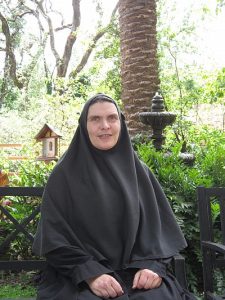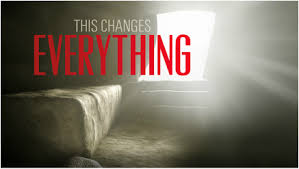This Changes Everything
The Evangelist (Nov/Dec 2006)
By Susan Cushman
[Another in my “series” of articles from the print-only newsletter of St. John Orthodox Church during the 1900s and 2000s. Since the Evangelist was print-only, of course there were no links in the articles, but I’ve added two here in case anyone is interested in reading more about Mother Melania.]
Our fourteenth year of hosting retreats brought another wonderful time for the Women of Saint John. This year we were blessed to have Mother Melania of St. Barbara Monastery in Santa Paula, California sped the weekend of September 14-17 with us. A few years ago her abbess, Mother Victoria, had spoken at our retreat, so we knew that good fruit could not fall far from the tree! (For more info on St. Barbara Monastery, go to http://www.ocadow.org/dow_events/st_barbara.htm.)
Amongst the natural beauty of the woods at Pinecrest Retreat Center, which is located in La Grange, Tennessee, a few shorts miles from St. Paul Skete, over 30 women gathered for an overnight retreat, complete with a campfire, old-fashioned s’more, and wonderful fellowship. Many thanks to retreat chairman Stacy Shipman, and her helpers, especially Sarah Hodges, Meribeth Harvey, Gigi Snowden, and others who helped with the logistics, making it possible for everyone to relax within the orderly flow of the weekend.
Mother Melania gave three talks on the topic, “Virtues, Passions, and the Healing of the Soul.” What follows is not a compilation of careful note-taking, but rather an impression and personal response to Mother Melania’s message.
Much of the background of the talks were familiar teachings on the vices and virtues and the approach to these as seen from the West (juridical) and the East (therapeutic). She was emphatic in saying that both of these paradigms for the Christian are legitimate if you know who you are and that God and His law are love. The law is good but we’re sick and we can’t keep it. We are, in fact, insane because sin is insanity. She defined this by saying that “blindness and insanity are not seeing things as they really are.” To illustrate this point, she held up a cookbook with a colorful picture of a pie on the front and asked us, “Why do they put this picture on the front of the cookbook?” Her answer was “so that we would want the real thing. . . to cook and eat a pie.” But what if we decide to eat the book cover, the picture of the pie, instead of the real thing? We would be insane—to eat the image rather than the real food. That’s what we do with our sins and passions—we choose the creation over the creator, and the more willfully we do this, the more deluded we are. To get well we must decide who we are walking towards and who we are going to be a temple of—God or ourselves.
She continued the weekend talks with another familiar presentation of the process of cure—purification, illumination, and theoria. But she encouraged us that even if we spend most of our lives in the purification phase, or as she put it, “cleaning our windows to let more light in,” that’s all right, so long as we’re on the journey. As she described the “cures” for each of the passions, she reminded us that we are not responsible for being well, God is—we’re only responsible for taking our cure. This was a good word for all of us who tend to get obsessed with figuring out what’s wrong with us in order to “fix it.” And it’s a temptation for those of us who live in the therapeutic paradigm for it to become “all about me.”
Again saying that the law wasn’t bad, Mother reminded us that Christ came to bring a new commandment—that you love God with all your heart, mind, and soul and your neighbor as yourself. This was the 3rd paradigm for Christian living that she introduced on Saturday—Community. She explained how our passions and sins affect the community, the Body of Christ, and that our motivation for getting healed must be love for God and for His Body, our brothers and sisters, not just to relieve our own suffering so that we’ll feel good. When she said this, I thought, “this changes everything.” How easy it is to become so wrapped up in our own individual cures that we isolate ourselves from others and don’t see or don’t care how our sins affect the community. She reinforced this paradigm by saying, “What make us persons is our relationship with God and with others, and that isolation is defining oneself as an individual rather than as a person.”
As Mother carefully went through the list of “medications” for our spiritual illnesses, including the sacraments, church life, fasting, alms, thanksgiving, prayers, obedience, etc., and followed this with an explanation of how the passions progress from thought to coupling to ascent to action and finally the passion, I found myself heaving a weary sigh, reflecting on my life-long struggles with all of this. She addressed that weariness as she wrapped up her talks by saying that in order to be healed we will need to ask God for two things: courage, which is necessary for obedience and taking the cure, and love, for God and for our brothers and sisters. May God grant us to grow in courage and love, for the healing of our souls and the building up of the Body of Christ, His Church. And may we be content to spend our lives keeping our windows clean!
